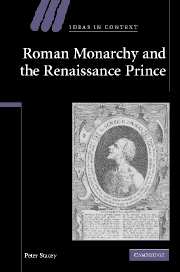Book contents
- Frontmatter
- Contents
- Acknowledgements
- Introduction
- PART I THE ROMAN PRINCEPS
- PART II THE ROMAN THEORY AND THE FORMATION OF THE RENAISSANCE PRINCEPS
- 2 The pre-humanist formation of the Renaissance princeps
- PART III THE HUMANIST PRINCEPS IN THE TRECENTO
- PART IV THE HUMANIST PRINCEPS FROM THE QUATTROCENTO TO THE HIGH RENAISSANCE
- PART V THE MACHIAVELLIAN ATTACK
- Conclusion
- Bibliography
- Index
- IDEAS IN CONTEXT
2 - The pre-humanist formation of the Renaissance princeps
Published online by Cambridge University Press: 22 September 2009
- Frontmatter
- Contents
- Acknowledgements
- Introduction
- PART I THE ROMAN PRINCEPS
- PART II THE ROMAN THEORY AND THE FORMATION OF THE RENAISSANCE PRINCEPS
- 2 The pre-humanist formation of the Renaissance princeps
- PART III THE HUMANIST PRINCEPS IN THE TRECENTO
- PART IV THE HUMANIST PRINCEPS FROM THE QUATTROCENTO TO THE HIGH RENAISSANCE
- PART V THE MACHIAVELLIAN ATTACK
- Conclusion
- Bibliography
- Index
- IDEAS IN CONTEXT
Summary
THE ROMAN THEORY AND THE REX IN THE REGNUM SICILIAE
The ‘great blaze of Seneca's popularity in the twelfth and thirteenth centuries’ in western Europe acquired a remarkable intensity in the protracted ideological confrontation between the papacy and the Holy Roman Emperor Frederick II over the latter's government of the Kingdom of Sicily in the first half of the Duecento. In 1231, some three years after the Regnum had been transformed into a battlefield by a papal army launched against the Sicilian monarch, one of the earliest instances of recourse to Senecan political theory stands out amid the series of military and juridical conflicts which helped define the development of the various monarchical centres of power on the Italian peninsula during the thirteenth century. As Kantorowicz and Marongiù noted, the prologue of the massive body of royal legislation, promulgated by Frederick in the aftermath of the invasion and entitled the Liber Augustalis, cites the preamble of De clementia, placing the words of the Senecan princeps in the mouth of Frederick, ‘ever Caesar Augustus of the Romans, Felicitous Victor and Conqueror of Italy, Sicily, Jerusalem, Arles’. Part of the Senecan theory thus became inscribed upon the constitutional document which provided the fundamental framework of public law within the Kingdom of Sicily from 1231 down to the Napoleonic era:
And so, by this compelling necessity of things, and no less by the inspiration of Divine Providence, princes of peoples were created so that through their agency unbridled wickedness might be restrained, so that these arbiters of life and death for mankind might establish – as if executors, so to speak, of Divine Providence – the fortune, lot and state of every person, and so that from their hands, they might be able to render account perfectly of the stewardship committed to them.[…]
- Type
- Chapter
- Information
- Roman Monarchy and the Renaissance Prince , pp. 75 - 116Publisher: Cambridge University PressPrint publication year: 2007

